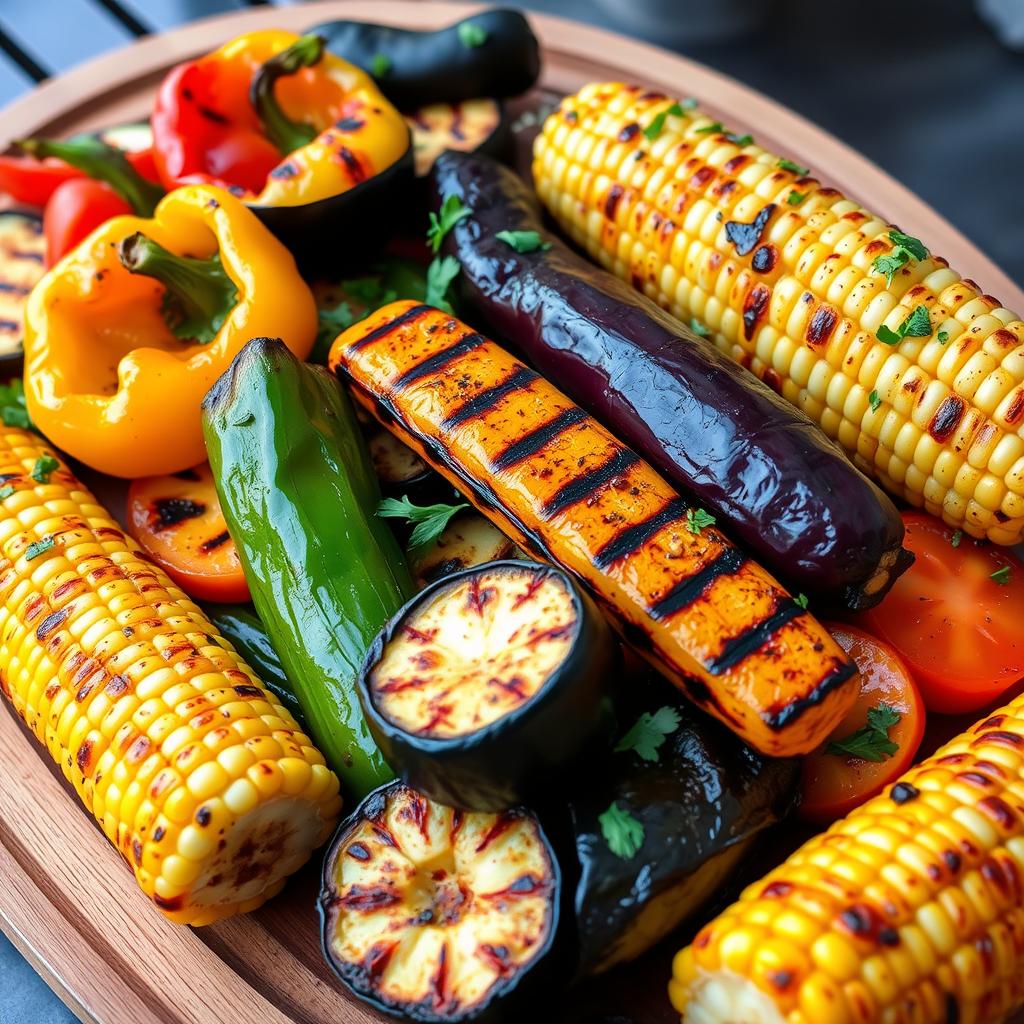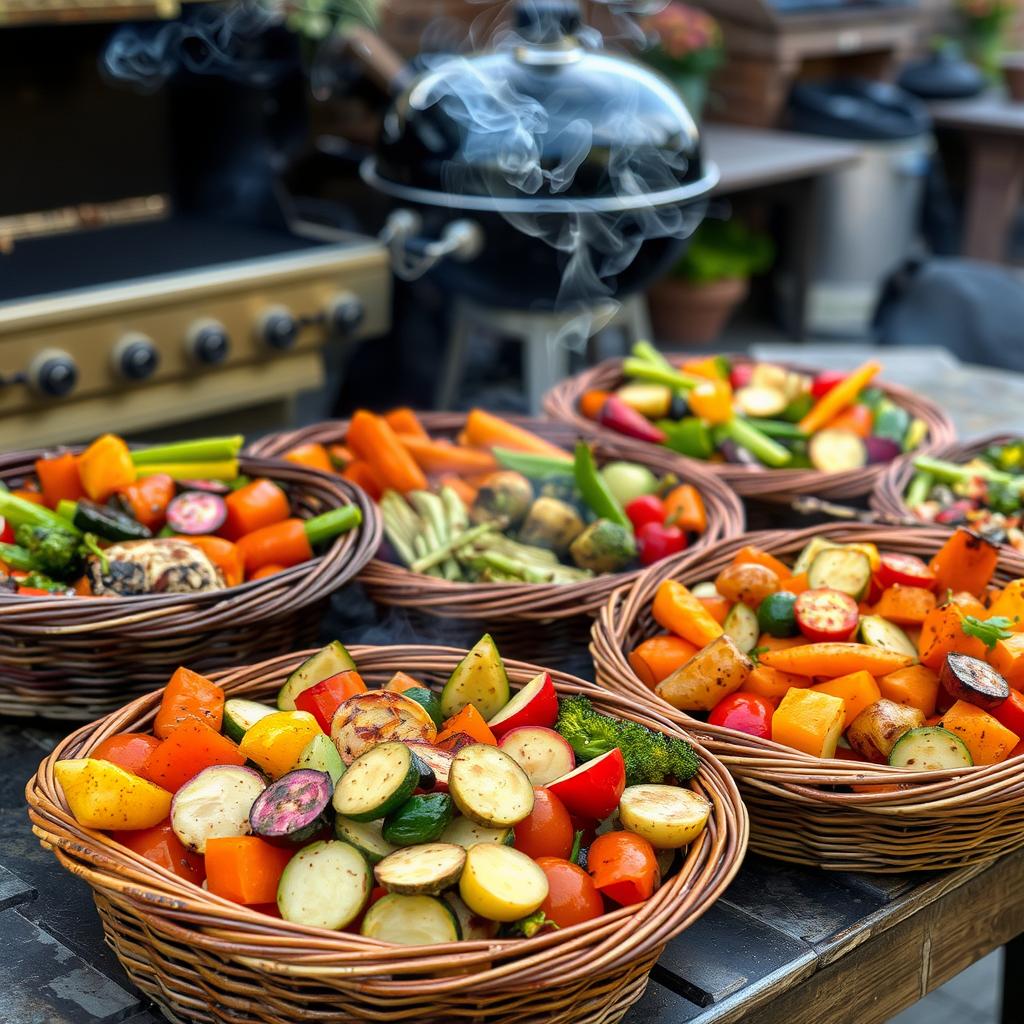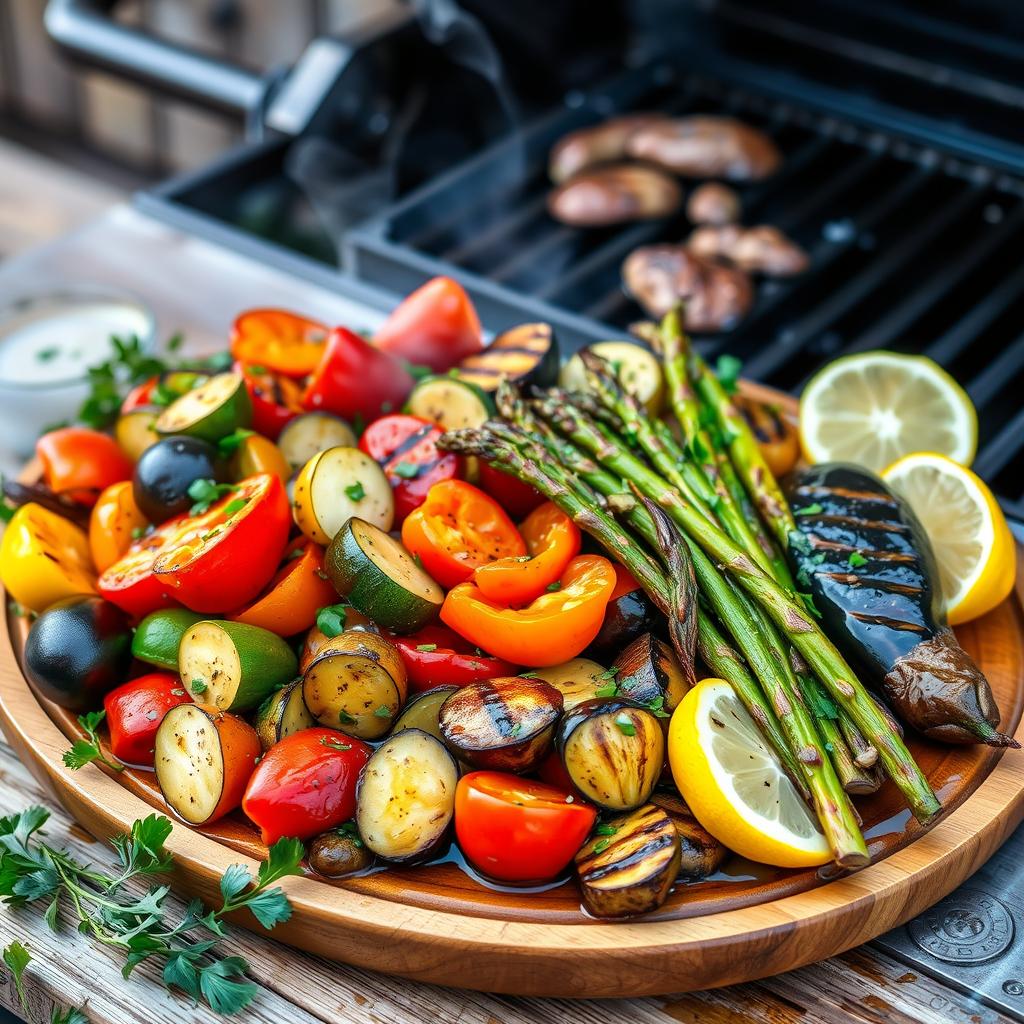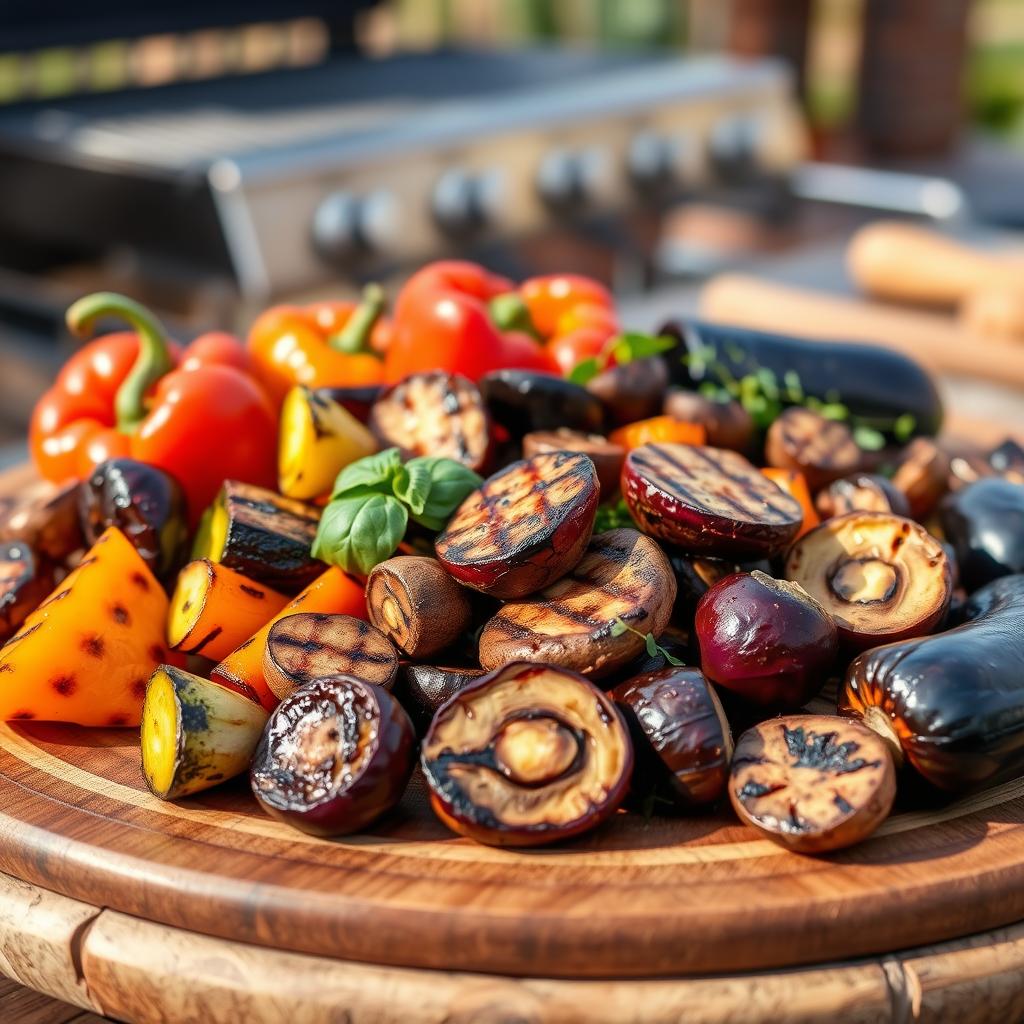The smell of grill vegetables is a summer delight. Whether it’s a backyard BBQ or a quiet night in, learning to grill veggies can make any meal special. Grilling brings out the best in your favorite vegetables and keeps them full of nutrients.
This guide will show you how to make grilled vegetables that are full of flavor and tender. We’ll cover everything from picking the right veggies to mastering grilling techniques. You’ll be able to impress everyone with your grilled veggies and enjoy the delicious results.
Table of Contents
The Benefits of Grill Vegetables
Grilling vegetables brings out their natural flavors and textures. The heat and smoky char from the grill make them sweeter. This method also keeps more nutrients than boiling, which can lose them.
Grilled veggies are crisp-tender and go well with many proteins. They’re a healthy, low-calorie side dish that you can tailor to your taste. You can grill everything from asparagus and peppers to zucchini and mushrooms.
Enhancing Flavor and Texture
The grill’s high heat caramelizes vegetables’ sugars, giving them a rich flavor. The smoky char adds a unique taste that other cooking methods can’t match. Grilling also makes veggies tender inside and crispy outside, which is very appealing.
Health Advantages of Grilled Veggies
- Grilling keeps more vitamins A and C, which are lost in boiling or steaming.
- Grilled veggies are low in calories and fat, making them great for a healthy diet.
- Grilling is a good way to eat a variety of veggies, helping you meet your daily needs.
| Nutrient | Boiled Vegetables | Grilled Vegetables |
|---|---|---|
| Vitamin C | 30% loss | 10% loss |
| Vitamin A | 20% loss | 5% loss |
| Dietary Fiber | 10% loss | Minimal loss |
Grilling is a tasty way to add more Grilled Vegetable Sides and Grilled Veggie Medleys to your meals. It helps you keep more nutrients and enjoy great flavors.
Choosing the Right Vegetables for Grilling
Not all vegetables are good for grilling. Some veggies love the heat, while others don’t. To make your Grilled Summer Veggies and Grilled Vegetable Platters tasty, pick the right ones.
Best Options for Grilling
The top veggies for grilling are:
- Bell peppers
- Zucchini
- Yellow squash
- Asparagus
- Onions
- Mushrooms
- Broccoli
- Cauliflower
These veggies can handle the grill’s heat well. They get a nice char and stay tender-crisp, perfect for summer.
Seasonal Vegetables to Consider
When planning your Grilled Vegetable Platters, use seasonal veggies. Eggplant, sweet potatoes, and green beans add flavor and color. But, avoid delicate greens that might wilt or burn.
Choose veggies of similar size and shape for even cooking. Cutting them the same size ensures every bite is grilled right. Mixing colors and textures makes your platter look great and taste even better.

“Grilling brings out the natural sweetness and caramelized flavors of vegetables in a way that boiling or steaming cannot. It’s a game-changer for veggie-lovers.”
| Vegetable | Grilling Tip |
|---|---|
| Zucchini | Slice into 1/2-inch thick rounds, marinate, and grill for 5 minutes per side. |
| Tomatoes | Halve or quarter, marinate, and grill for 10-15 minutes. |
| Mushrooms | Grill whole, on skewers, or stuffed for delicious results. |
Preparing Your Vegetables for the Grill
Grilled Grilled Veggie Kebabs and Grilled Vegetable Skewers are tasty and healthy. They let you enjoy the season’s best. To get your grilled veggies just right, prep them well before grilling.
Cleaning and Cutting Techniques
First, wash your veggies well to get rid of dirt. Then, cut them into pieces that are 1-2 inches long. This makes sure they cook evenly. For Grilled Veggie Kebabs, cut them into small chunks. Carrots and potatoes might need more time on the grill.
Marinating for Extra Flavor
Marinating your veggies before grilling can make them taste even better. Mix olive oil, lemon juice, balsamic vinegar, herbs, and spices for a marinade. Let the veggies soak in the flavors for 30-40 minutes. Before grilling, thread them onto skewers or place them on the grill grates. Stay away from sweet marinades, as they can burn quickly.
“Grilled vegetables pair well with almost any protein, making them a versatile and flavorful side dish.”
With some prep, your Grilled Veggie Kebabs and Grilled Vegetable Skewers will impress everyone. Enjoy the fresh, smoky taste of grilled veggies all season.
Essential Grilling Tools and Equipment
Grilling Grilled Vegetable Baskets and Barbecue Vegetables needs the right tools and equipment. You’ll need must-have grill accessories and the right grill type. The right gear makes a big difference in your grilling experience and the quality of your food.
Must-Have Grill Accessories
A reliable Grilled Vegetable Baskets is key to keep small pieces from falling through the grates. The Outset Round Copper Grill Wok is a top pick. Also, you’ll need sturdy tongs, a sharp knife, and a durable cutting board.
Choosing the Right Grill Type
For Barbecue Vegetables, choosing between a gas or charcoal grill matters. Gas grills are easier to use, while charcoal grills give a smoky taste. Think about what you prefer and need for your Grilled Vegetable Baskets and Barbecue Vegetables.
| Grill Accessory | Recommendation | Price Range |
|---|---|---|
| Spatula | Char-Broil Comfort Grip Spatula | $12 – $10 |
| Tongs | Rösle 12-Inch Tongs | $40 – $35 |
| Grill Brush | Grillart Grill Brush | $18 – $16 |
| Grill Lighting | Permasteel Light Set | $25 – $22 |
| Thermometer | Thermapen ONE Instant-Read Thermometer | $105 – $99 |
| Charcoal Ignition | Weber Rapidfire Chimney Starter | $30 – $28 |

Techniques for Perfectly Grilled Vegetables
Grilled Vegetables add a delightful and healthy touch to any summer barbecue. To get them just right, you need to know about direct and indirect heat. Also, timing is key, depending on the vegetables you’re grilling.
Direct vs. Indirect Heat
For most vegetables, direct heat is best. This means placing them right over the heat source at 400-425°F. This high heat gives them a nice char and caramelized taste on the outside. It also makes sure they cook through.
Denser vegetables like potatoes and carrots should go on the grill first. They take longer to cook.
Grilling Times for Different Veggies
- Bell peppers, onions, and mushrooms: 8-10 minutes
- Squash, zucchini, and asparagus: 6-8 minutes
Change the grilling time based on the vegetable’s size and how done you like it. Make sure to stir or flip them often, especially if they’re in a grill basket. This helps them cook evenly.
With these techniques, you’ll make perfectly charred, tender, and tasty grilled vegetables every time.
Flavorful Marinades and Seasonings
Make your grilled vegetable sides and Barbecue Vegetables even better with tasty marinades and dry rubs. Add strong flavors to your grilled produce for a burst of taste.
Simple Marinade Recipes
A basic marinade is key for great grilled veggies. Try this simple Balsamic Marinade:
- 3 tablespoons balsamic vinegar
- 3 tablespoons extra virgin olive oil
- 1 1/2 teaspoons kosher salt
- 2 garlic cloves, minced
- 2 tablespoons chopped fresh parsley or basil
Just mix the ingredients and marinate your veggies like bell peppers, zucchini, eggplant, and mushrooms for up to 3 hours. This marinade works well with veggies and proteins too.
Dry Rub Ideas for Grilled Veggies
For a tasty crust on your Grilled Vegetable Sides, use a flavorful dry rub. Here are some great mixes:
- Italian seasoning, garlic powder, and smoked paprika
- Chili powder, cumin, and brown sugar
- Cajun spice blend with a touch of cayenne
Coat your veggies well with the dry rub before grilling. This will keep those delicious flavors in. Try different spice mixes to find your favorite Barbecue Vegetables.

“The key to exceptional grilled vegetables is all in the marinade and seasoning. Get creative with bold flavors to make your produce shine.”
Creative Ways to Serve Grilled Vegetables
Grilled vegetables add flavor and versatility to any meal. They’re not just for sides anymore. You can use them to make salads better or add nutrition to main dishes. Grilled Veggie Medleys and Grilled Vegetable Platters open up a world of tasty options.
Salad Toppers and Sides
Grill veggies and add them to your favorite salads. The smoky taste goes well with fresh greens and cheeses. Try grilled romaine on a Caesar salad or mix charred zucchini and bell peppers into a Mediterranean salad.
For a quick side, mix grilled asparagus, carrots, and cherry tomatoes. Drizzle with balsamic for a tasty Grilled Veggie Medley.
Incorporating into Main Dishes
Grilled veggies can change your main dishes. Use them as toppings for pizzas, sandwiches, and burgers. Or add them to pasta for more flavor and nutrition.
For a filling vegetarian meal, make a Grilled Vegetable Platter. Serve it with quinoa or farro for a healthy, satisfying dish.
“Grilling vegetables brings out their natural sweetness and adds a delightful smoky char that elevates any dish.” – Chef Emily, Grill Master
Adding grilled veggies to your meals can impress guests or make a healthy meal. Try different flavors and presentation styles to find your favorite grilled veggie dishes.
Common Mistakes to Avoid
Grilling vegetables can make them taste better and feel more tender. But, there are mistakes to watch out for. Knowing these can help you make your grilled veggies taste amazing every time.
Overcooking and Burning
One big mistake is overcooking your veggies. This makes them mushy and not tasty. Keep an eye on them while they’re grilling. Adjust the heat to keep it steady and moderate.
Ignoring Seasoning Opportunities
Don’t forget to season your veggies before grilling. Marinating or seasoning them adds flavor. But, be careful with sweet marinades as they can burn easily.
- Ensure vegetables are cut into similar sizes for even cooking
- Avoid placing small pieces directly on the grill grates to prevent them from falling through
- Use just enough oil to lightly coat the vegetables, as too much can cause flare-ups
By avoiding these mistakes, you can grill your veggies perfectly. This will make them taste great and impress everyone.

Cleaning Your Grill After Cooking
Keeping your grill clean is key for great-tasting Barbecue Vegetables and Grilled Vegetable Recipes. Simple cleaning steps can keep your grill in great shape and make it last longer.
Quick Cleaning Tips
Cleaning your grill right after use is best. Use a grill brush to get rid of food bits and grime. For a natural cleaner, rub a halved onion on the grates. The onion’s acidity and antimicrobial properties can break down grease and grime quickly.
Deep Cleaning Techniques
For a deeper clean, wait until the grill cools down completely. Then, take out the grates and soak them in warm, soapy water. This helps loosen tough buildup. While the grates soak, clean the grill’s inside and outside with a grill cleaner or a mix of white vinegar and water. Don’t forget to empty the grease trap after each use.
| Grill Type | Cleaning Time (Regular) | Cleaning Time (Deep) | Cleaning Frequency |
|---|---|---|---|
| Gas Grill | 10-15 minutes | 1-2 hours | Once or twice a year |
| Charcoal Grill | 10-15 minutes | 30 minutes – 1 hour | After every 3 uses |
By sticking to these cleaning tips, you’ll make sure your Barbecue Vegetables and Grilled Vegetable Recipes are always a hit.
Inspiring Grilled Vegetable Recipes to Try
Make your summer grilling better with tasty grilled vegetable recipes. Try Grilled Veggie Kebabs or a delicious Grilled Vegetable Medley Salad. These dishes highlight the great taste and variety of grilled veggies.
Colorful Vegetable Skewers
Make a colorful dish by grilling Grilled Veggie Kebabs. Use skewers with bell peppers, cherry tomatoes, zucchini, and mushrooms. Brush them with olive oil mixed with herbs before grilling. This keeps them moist and adds a nice smell.
Grilled Vegetable Medley Salad
Grill your favorite veggies, then chop them. Mix with greens, feta cheese, and a light dressing. This Grilled Vegetable Medley Salad lets you try different veggies and flavors. It’s a great way to make your own special dish.

